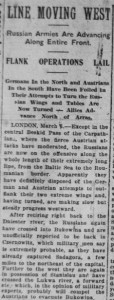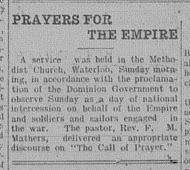On 29 June, local newspapers informed Waterloo Region citizens that Archduke Franz Ferdinand and his wife had been assassinated in Sarajevo, Bosnia the day before. Although the newspaper reported on this tragedy, newspapers in the region were primarily preoccupied with the provincial election being held on 29 June. The newspapers focused heavily on the election and who was elected as representatives of the region to the Legislative Assembly of Ontario. C.H. Mills was elected in Waterloo North and Z. A. Hall in Waterloo South, as Members of Provincial Parliament (MPPs). The Ontario Conservative Party won its fourth consecutive term in government under the leadership of James P. Whitney. Although, the region was aware of international news, it is evident that in late June and early July 1914 local and provincial news still dominated the news.
Valcartier, Quebec Selected as Canadian Mobilization Base (2 August 1914)
On 2 August, the Minster of Militia, Colonel Sam Hughes, announced that a base would be constructed just outside of the municipality of Saint Gabriel de Valcartier, Quebec, for the mobilization of a Canadian Expeditionary Force. The camp would be approximately 25 km north of Quebec City and accessible by railroad. The site was selected with the expectation that Canada would receive a call for an overseas force within the next few days. Hughes expected the site to be ready to accept men within a week; however, construction of the site took three weeks. Men began arriving at Valcartier in mid-August for military training before being sent overseas.
(“Contingent may be called for within few days,” London Free Press, 3 August 1914; “Would Join Force,” Berlin Daily- Telegraph, 11 August 1914; “Need Is Exceeded,” Berlin Daily- Telegraph, 14 August 1914; To Mobilize Tomorrow,” Waterloo Chronicle-Telegraph, 20 August 1914; Visual: http://www.canadiangreatwarproject.com/Maps/mapValcartierR.jpg )
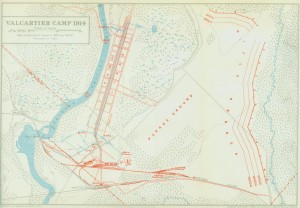
Prayers for the Empire (7 January 1915)
Religion played a large role in the lives of citizens during the First World War as this article clearly demonstrates. The Waterloo Methodist Church was one of many Churches that, in accordance with a proclamation made by the Dominion Government, observed the past Sunday (January 3) as an intercession (praying on behalf of) for the Empire and her soldiers and sailors engaged in the war.
“Prayers for the Empire,” Waterloo Chronicle, January 7, 1915.
War-Time Cooking and Food Values (11 March 1915)
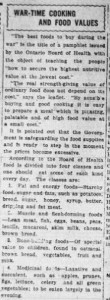 Cooking in times of war can be difficult as, in addition to local needs, food is also shipped to the troops at the front, to war refugees, and to hospitals. The price of food also inflates (rises), making it more expensive and difficult to feed a family. Therefore, the Ontario Board of Health published a pamphlet, entitled “The best foods to buy during the war”, to help educate the people on the home front about the best affordable and nutritional foods to buy. There were four categories of food – fat and energy foods, muscle and flesh-forming foods, bone-building foods, and medical foods. It also examined alternatives, such as only having meat once a day and replacing meat at certain meals with dried beans and peas, which contain the same amount of flesh-forming material as meat, but were much cheaper. The article also re-assured the reader that the government was watching the price of food and would step in if prices went too high.
Cooking in times of war can be difficult as, in addition to local needs, food is also shipped to the troops at the front, to war refugees, and to hospitals. The price of food also inflates (rises), making it more expensive and difficult to feed a family. Therefore, the Ontario Board of Health published a pamphlet, entitled “The best foods to buy during the war”, to help educate the people on the home front about the best affordable and nutritional foods to buy. There were four categories of food – fat and energy foods, muscle and flesh-forming foods, bone-building foods, and medical foods. It also examined alternatives, such as only having meat once a day and replacing meat at certain meals with dried beans and peas, which contain the same amount of flesh-forming material as meat, but were much cheaper. The article also re-assured the reader that the government was watching the price of food and would step in if prices went too high.
“War-Time Cooking and Food Values,” Berlin Daily Telegraph, March 11, 1915.
Woman’s Duty to Empire (25 March 1915)
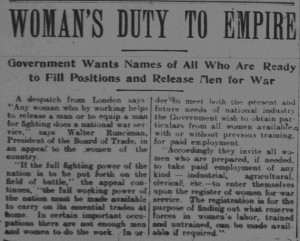 During the First World War, women working outside the home became more acceptable, even encouraged, especially if it freed a man to fight or equipped a man to fight. For the full fighting power of a nation to be realized, everyone with the ability to work on the home front must do so. Unfortunately, there were not always enough men or women available fulfill these economic and national needs. Therefore, the government also requested that women register, whether trained or not, so the government would know they could call upon them if they were needed.
During the First World War, women working outside the home became more acceptable, even encouraged, especially if it freed a man to fight or equipped a man to fight. For the full fighting power of a nation to be realized, everyone with the ability to work on the home front must do so. Unfortunately, there were not always enough men or women available fulfill these economic and national needs. Therefore, the government also requested that women register, whether trained or not, so the government would know they could call upon them if they were needed.
“Woman’s Duty to Empire,” Ayr News, March 25, 1915.
Corporal George Cecil Potts
George Cecil Potts was born on June 2nd, 1893 in England. George was educated at Stoke-on-Trent in Staffordshire, England. In 1912 George and his mother Mary immigrated to Canada and settled in Galt (Cambridge), where Mary worked as a shopkeeper. George worked as a shoe cutter and was an active member of the 29th Regiment (Waterloo Regiment) for three years. When the First World War broke out in August 1914, George volunteered to join the Canadian Expeditionary Force where he was promoted up to the rank of Corporal. Sadly on October 13th, 1915 George was killed in action in the trenches northeast of Wulverghem at the age of 22 Corporal George Cecil Potts is buried at the St. Quentin Cabaret Military Cemetery in Belgium.
Service number: 7067
“Canadian Virtual War Memorial: George Cecil Potts,” Veterans Affairs Canada, accessed March 21, 2015, http://www.veterans.gc.ca/eng/remembrance/memorials/canadian-virtual-war-memorial/detail/444450?George%20Cecil%20Potts
Line Moving West (29 March 1915)
By the beginning of March, the Canadian Press Service was reporting that the German advance along the Eastern front had been reversed. With the exception of heavier resistance from the Austrians in the Carpathian Mountains to the south, a large portion of the Eastern Front from the Baltic Sea to the Romanian border was reported to be advancing westward. By the middle of March, the Russians had defeated Austrians in the Carpathians, reportedly taking 4000 prisoners and pushed further into present-day Slovakia and Poland. Within a few days, the fortress at Przemysl was taken by the Russians. This was a large victory since Russia had been trying to capture it since December, it was believed to be essential to German General von Hindenburg’s northern strategy, and it was the media’s focus throughout this push along the Eastern Front. By the end of March, Austrians were reportedly “in full retreat” over the Carpathian Mountains.
These successes occurred alongside optimistic outlooks for the British fleet in the Dardanelles and the Entente along the Western Front. Together, they contributed to the estimates that the Entente would win the war within a few months.
(“German Invasion of Russian Soil Has Completely Failed,” Berlin Daily Telegraph, 1 March 1915.; “Line Moving West,” Berlin Daily Telegraph, 6 March 1915.”; “German Defeat in Poland,” Ayr News, 18 March 1915.; Przemysl Surrendered Today,” Berlin Daily Telegraph, 22 March 1915.; “North Poland Clear of Enemy,” Ayr News, 25 March 1915.; “Austrians Retire,” Berlin Daily Telegraph, 29 March 1915.)